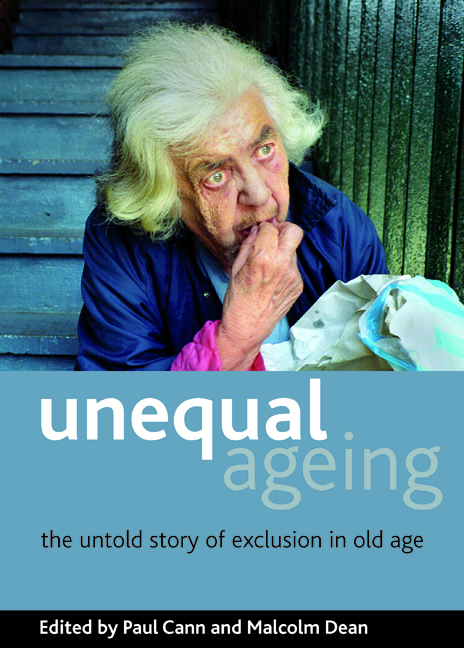Book contents
- Frontmatter
- Contents
- List of tables and figures
- Notes on contributors
- Acknowledgements
- one How social age trumped social class?
- two Too tight to mention: unequal income in older age
- three three The uneven dividend: health and well-being in later life
- four No place like home? Housing inequality in later life
- five What does it mean to be old?
- six A life worth living? Quality of life in older age
- seven Why is ageing so unequal?
- eight Rewriting the story
- Index
six - A life worth living? Quality of life in older age
Published online by Cambridge University Press: 16 July 2022
- Frontmatter
- Contents
- List of tables and figures
- Notes on contributors
- Acknowledgements
- one How social age trumped social class?
- two Too tight to mention: unequal income in older age
- three three The uneven dividend: health and well-being in later life
- four No place like home? Housing inequality in later life
- five What does it mean to be old?
- six A life worth living? Quality of life in older age
- seven Why is ageing so unequal?
- eight Rewriting the story
- Index
Summary
• Seventeen per cent of older people have less than weekly contact with family, friends and neighbours, and 11 per cent have less than monthly contact.
• Seven out of 10 older people have never used the internet.
• Seventy per cent of 25- to 44-year-olds have recently attended an arts event, compared with just over 40 per cent of the over-75s.
Boomers beating biology
‘After 60 – no matter what – your skin can let you down,’ says Jane Fonda in a 2009 television advertisement for a L’Oréal skincare product for older women.
It seems like only yesterday – it was, in fact, 1982 – that Fonda, then 45, was teaching us to tone our bodies in her first Workout video. In doing so, she launched the exercise craze of the 1980s with all the attendant glorifications of the perfect, gym-fit body. It was an aspect of the age's yearning for self-actualisation, the belief in the autonomous, monadic self that also produced the financial imperative ‘greed is good’ and, in a weak moment, Margaret Thatcher's remark that there is ‘no such thing as society’.
‘The human body’, said Wittgenstein, ‘is the best picture of the human soul.’ The soul of the 1980s was lean, greedy, super-fit and far too young for its years. But then again, as Fonda tells us, after 60 your skin can let you down – no matter what. Yet, even after 60, we must remain fervent self-actualisers – what else is there to do? Being young is the only game in town. We must act to halt the decline of our skin tone because, as L’Oréal advertisements always insist, ‘We’re worth it’.
Having it all
Fonda, although born in 1937, is a baby boomer heroine. The generation born between 1945 and 1964 forms a thickish cohort that, from the 1980s onwards, grew edgy about their ageing bodies. This was, after all, the generation that had everything – liberation, in the 1960s, from the oppressive sexual mores of the past, unprecedented increases in affluence, the glittering gadgets of a technological explosion – and, as a result, was unused to being denied anything. And yet here, in the mirror, was slackening skin, a sure sign that they could not have eternal youth, that death stalked their Arcadia.
- Type
- Chapter
- Information
- Unequal AgeingThe Untold Story of Exclusion in Old Age, pp. 123 - 140Publisher: Bristol University PressPrint publication year: 2009



